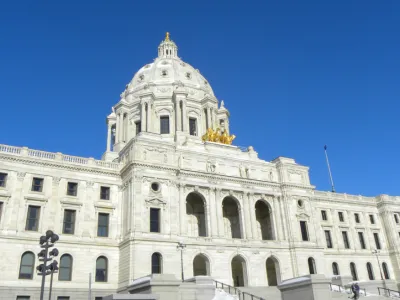CUB bill will expand public interest representation at the Public Utilities Commission

Published February 22, 2021. Updated March 1 to include Senate File number.
A bill being advanced by CUB and the Energy CENTS Coalition at the state legislature would expand the opportunity for public representation at the Public Utilities Commission.
The bill updates a Minnesota law called “intervenor compensation,” which allows people and nonprofits to have their costs of participating at the Public Utilities Commission (PUC) reimbursed under certain criteria. Current law allows such compensation only in general rate cases when a utility requests an increase to the base rate for electricity or natural gas. CUB’s bill would expand compensation to other types of PUC proceedings as well as allow tribal nations to qualify. The bill is being carried by Representative Athena Hollins in the House (HF 1289) Senator Nick Frentz (SF 1621).
The Public Utilities Commission’s job is to balance many priorities to ensure that electricity and natural gas service is affordable, reliable, complies with the state’s environmental and other laws, and allows utility companies the opportunity to earn revenues and a fair rate of return. Because of its quasi-judicial nature, the PUC must consider only the evidence and arguments on the record before it in any proceeding. That means the commissioners depend on parties to bring evidence in each proceeding that is representative of the variety of interests they must weigh.
However, it’s quite difficult to participate at the PUC, especially to do so well. It often takes hours of research, writing formal legal filings, and coordinating and negotiating with utilities and other parties. Many important issues require knowledge of very technical topics, for which parties must hire outside experts. And it’s helpful to have the kind of understanding of the process and precedent that can only be gained from years of experience in that venue. This kind of rigorous record building is what allows the PUC to make informed decisions on very complex questions. However, it’s costly and extremely difficult for public interest organizations to keep up.
In addition, the number and scope of proceedings at the PUC have increased dramatically. General rate cases are certainly still very important, but they happen only periodically. For example, Xcel last went through an electric rate case 6 years ago, and Minnesota Power had no rate cases between 2009 and 2016. Rates still increase between rate cases, of course, but that happens in other types of proceedings. In addition, there are proceedings related to shutoff practices; decisions to invest hundreds of millions in new power plants, new meters, or other infrastructure; customer service standards; and many others.
Participation by public interest organizations at the PUC has resulted in lower utility costs; funding and programs for low-income consumers; affordable payment plans, shutoff protections, and reporting from utilities on customers at risk of shutoff; investigating unlawful utility customer service practices; adopting utility data access standards; greater renewable energy; and much more. However, such organizations often have to carefully choose which proceedings they can participate in, and must forego many more proceedings due to a lack of resources.
While the utility companies recover their costs of participating at the PUC -- many millions of dollars -- from ratepayers, there is currently no similar mechanism for non-governmental organizations who represent public interests, aside from in rate cases.
The result is that, too often, the PUC has to make important decisions with records that do not reflect all of the perspectives that commissioners need to take into account.
The legislature created intervenor compensation to address the need for robust representation at the PUC so that the commission has what it needs to do its job. After 14 years, the statute is now in need of an update.
This bill would:
- Expand compensation beyond rate cases to other types of utility proceedings and allow tribal nations to receive compensation.
- Establish caps so that the cost of compensation would never be significant for ratepayers. The bill caps the amount a participant can receive in a single proceeding, the amount a participant could receive in a year, and the total amount a utility could be required to pay in a year.
- Ensure strict qualifications for compensation. Participants can only receive compensation if they materially assist the PUC, and the bill strengthens the definition of “materially assist” in current law.
Discussions are ongoing with utilities, the state Department of Commerce, and large industry to address some concerns with the current language of the bill. We are working on an amendment and believe that, with some adjustments, the bill will be able to move forward with consensus support. Some of the areas that are under discussion for changes include reducing the maximum amount of compensation a utility may be required to pay and further ensuring that compensation is granted only for participation that advances the public interest.